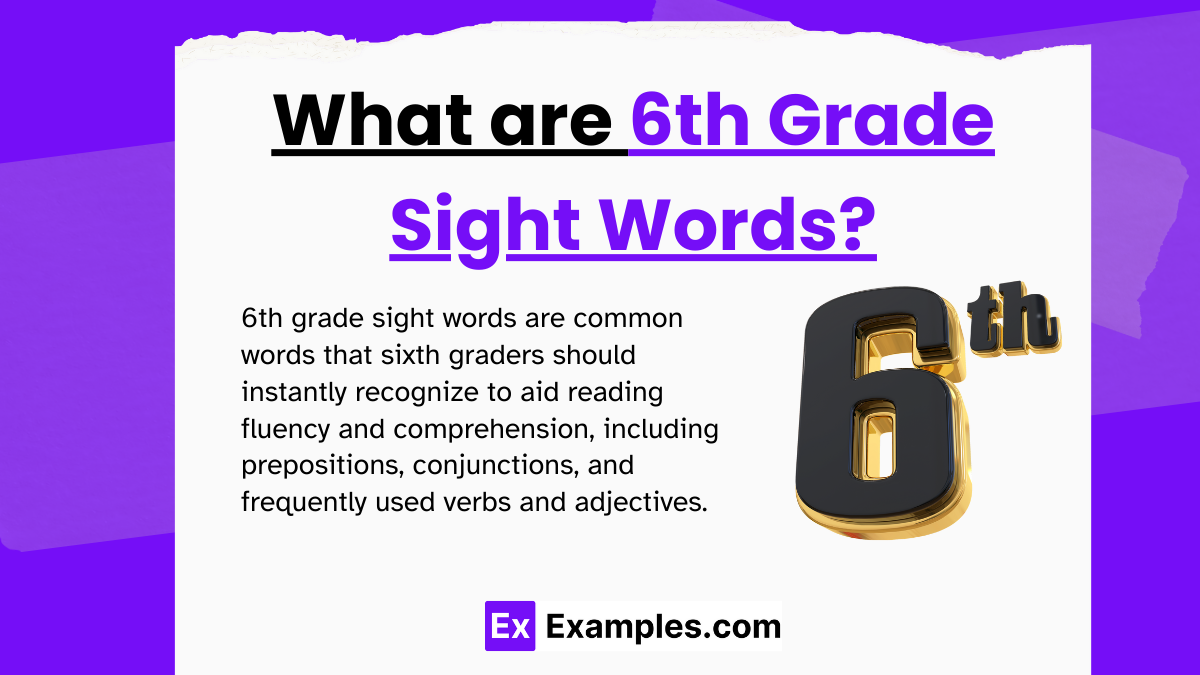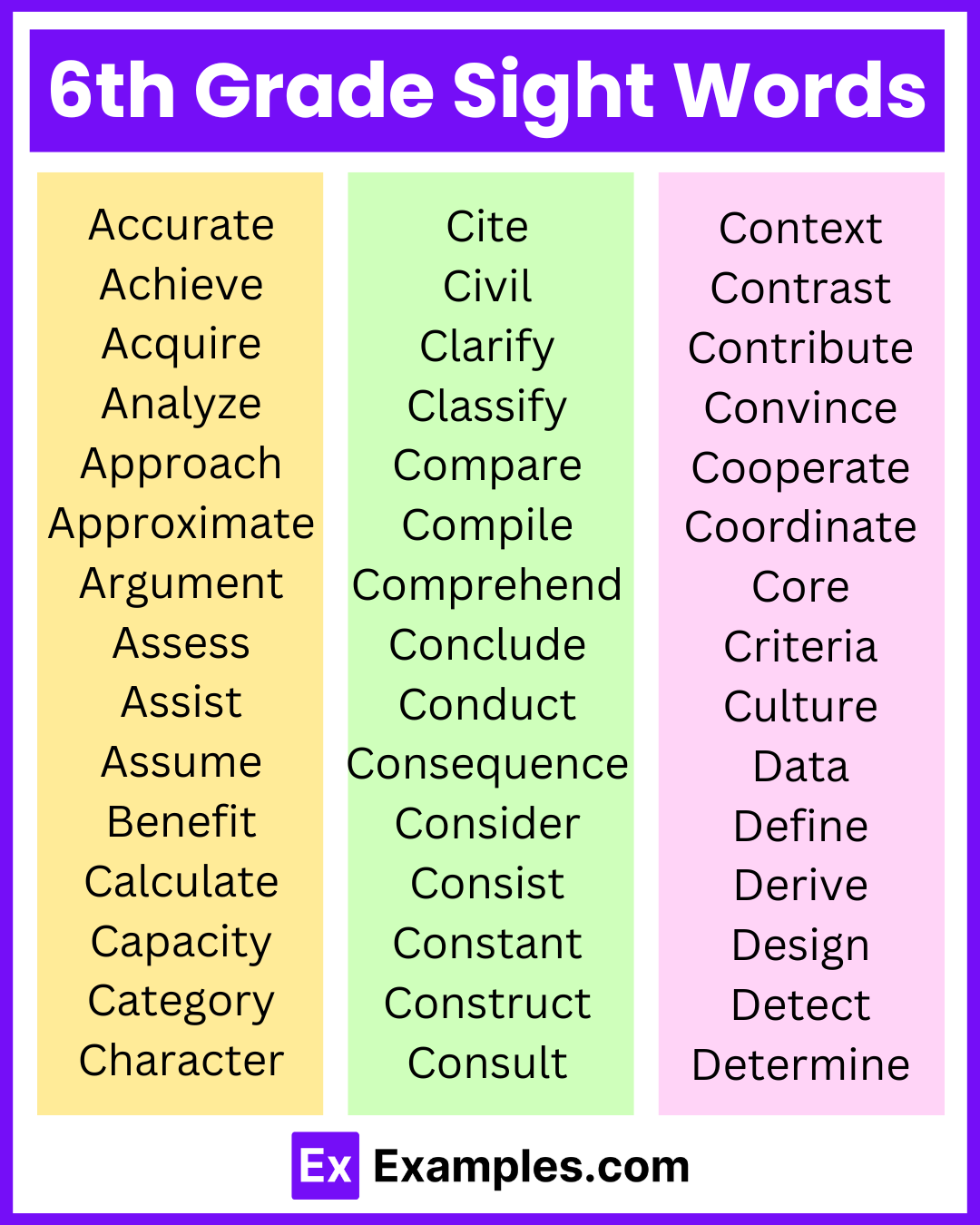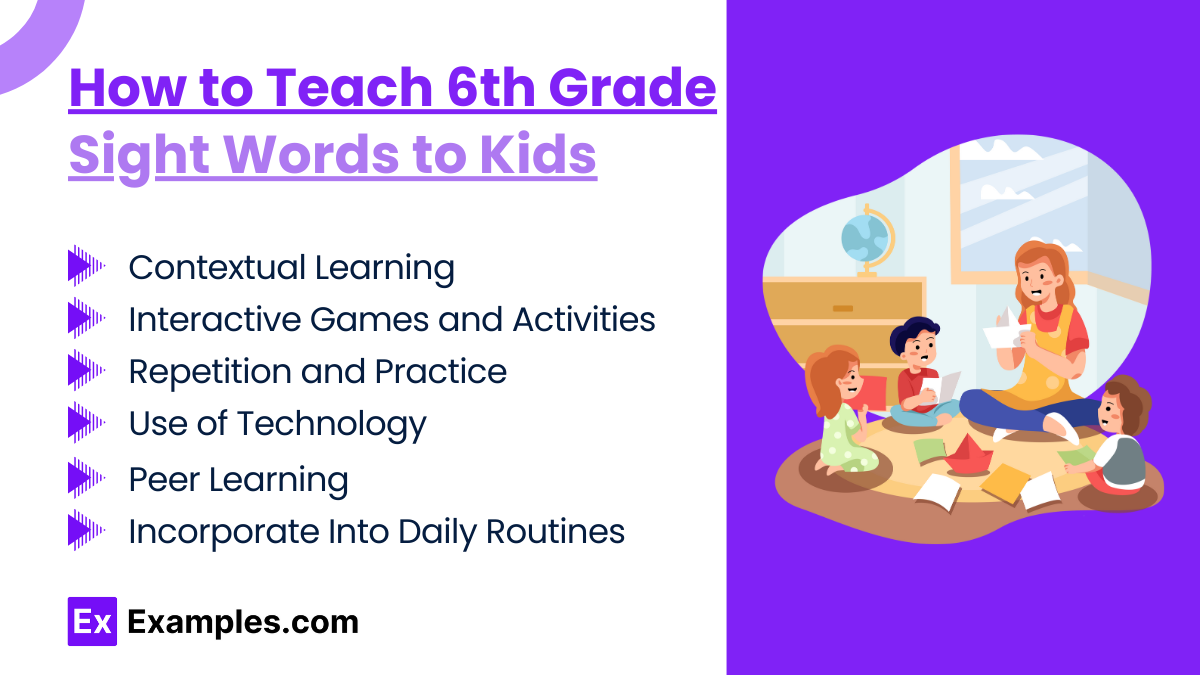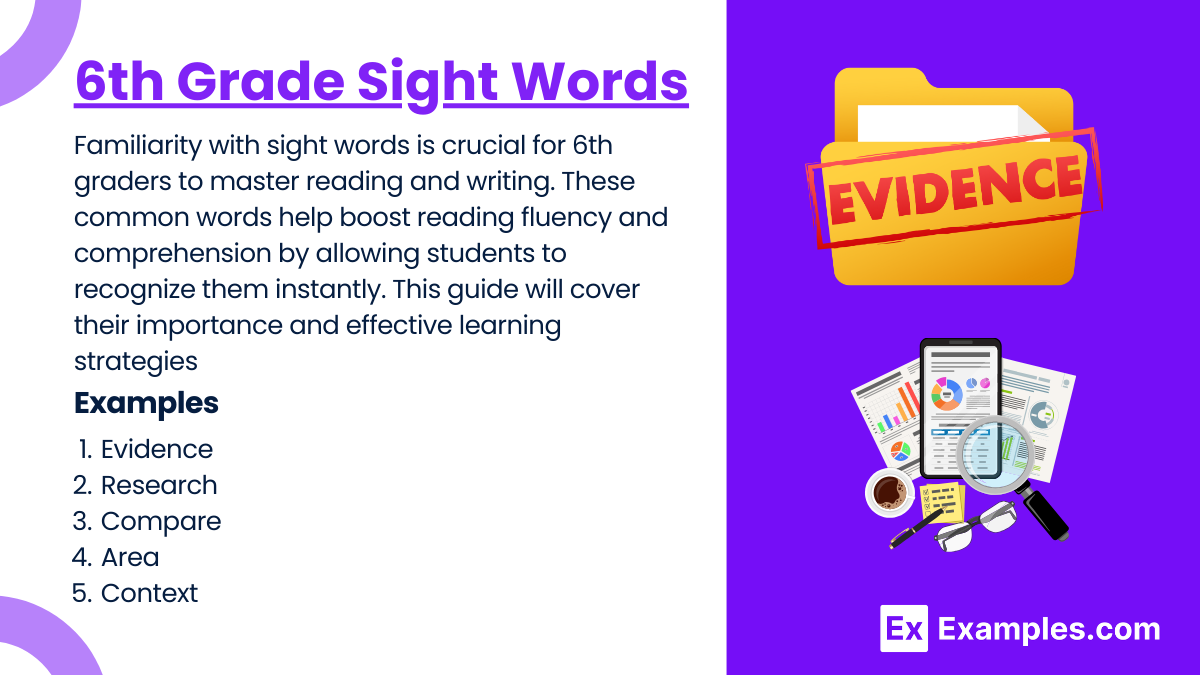100+ 6th Grade Sight Words List, Meaning, PDF
When it comes to mastering reading and writing in 6th grade, familiarity with sight words can make a big difference. Sight words are common words that students are encouraged to recognize instantly, without needing to sound them out. For parents and educators looking to support their 6th graders, understanding the importance of these words is key. This introduction to 6th grade sight words will explore why they are essential, how they fit into the broader curriculum, and effective strategies to help children learn them efficiently. Whether at home or in the classroom, integrating sight words into daily learning can boost reading fluency and comprehension, setting students up for success in their academic journey.
What are 6th Grade Sight Words?


List of 6th Grade Sight Words
| achieve | compare | evidence |
| analysis | component | illustrate |
| approach | concept | impact |
| area | conclude | indicate |
| assess | conduct | individual |
| assume | consequence | interpret |
| authority | construct | involve |
| available | context | issue |
| benefit | create | maintain |
| capacity | data | method |
| category | define | occur |
| commission | derive | percent |
| common | distribute | principle |
| community | economy | process |
| complex | environment | required |
| compute | establish | research |
| concept | estimate | respond |
| conclude | evaluate | role |
| conduct | evidence | section |
| consequence | factor | significant |
Download More Sight Words in PDF
List of Sixth Grade Sight Words with Meanings and Usage
| Sight Word | Meaning | Usage |
|---|---|---|
| Analyze | To examine in detail to understand parts, relationships, and interpretations. | Scientists analyze data to draw conclusions. |
| Cite | To mention as an example or to support an argument. | She can cite several instances where the experiment succeeded. |
| Compare | To examine two or more items to identify similarities and differences. | Let’s compare the features of these two novels. |
| Contrast | To highlight differences between two or more things. | The essay will contrast traditional and modern teaching methods. |
| Evidence | Material that proves or disproves something; information used to support a claim. | The research provides compelling evidence supporting the theory. |
| Infer | To conclude from evidence and reasoning rather than explicit statements. | From the clues, we can infer the treasure’s location. |
| Interpret | To explain the meaning of information, words, or actions. | The students learn to interpret complex texts in literature class. |
| Justify | To show or prove to be right or reasonable. | You need to justify your decision with solid arguments. |
| Perspective | A particular attitude toward or way of regarding something; a point of view. | The novel is written from a child’s perspective. |
| Summarize | To give a brief statement of the main points of something. | Can you summarize the main argument of the article? |
How to Teach 6th Grade Sight Words to Kids

Teaching 6th grade sight words effectively involves a combination of strategies tailored to engage students at this level. Here are some approaches:
- Contextual Learning: Introduce sight words within the context of interesting and age-appropriate reading materials. Discussing the meaning of the words as they appear in texts helps with retention and understanding.
- Interactive Games and Activities: Utilize educational games and activities that encourage the use of sight words. For example, word matching games, fill-in-the-blanks, and word scavenger hunts can make learning fun and engaging.
- Repetition and Practice: Regular practice is key to memorizing sight words. Use flashcards, word lists, and writing exercises to reinforce recognition and spelling. Encourage students to write sentences or short paragraphs using new sight words.
- Use of Technology: There are many apps and online resources designed to help students learn sight words. These can be especially appealing to 6th graders, providing interactive and multimedia approaches to learning.
- Peer Learning: Encourage students to work in pairs or small groups to quiz each other on sight words. Peer learning can make the process more enjoyable and provide valuable speaking and listening practice.
- Incorporate Into Daily Routines: Find opportunities to incorporate sight words into everyday situations. For example, ask students to identify sight words in instructions, signs, menus, or while reading for pleasure.
Tips for Teaching 6th Grade Sight Words to Kids
- Incorporate Multimedia Resources: Utilize videos, educational software, and interactive websites designed for sight word learning. Multimedia resources cater to various learning styles and can make the learning process more engaging for 6th graders.
- Create a Word-Rich Environment: Surround students with sight words by labeling classroom objects, creating word walls, and displaying new words prominently. This constant exposure helps reinforce their learning in a natural, unforced way.
- Use Flashcards Regularly: Flashcards are a classic, effective tool for memorization. Regular, short sessions with flashcards can help students quickly recognize and recall sight words.
- Practice with Writing: Encourage students to write sentences or short stories using sight words. This not only helps with memorization but also improves their writing skills and ability to use words in context.
- Personalize Learning: Recognize that each student learns at their own pace. Personalize sight word instruction based on individual needs, offering more support where needed and challenging students who are ready to move ahead.
- Engage in Reading Activities: Incorporate sight words into reading activities. Ask students to highlight or write down sight words they encounter in their reading assignments. Discuss the words’ meanings and uses in the context of the text.
- Play Educational Games: Word games like bingo, memory match, and word searches can make learning sight words fun and competitive. These games help improve recognition and spelling in an enjoyable way.
Benefits of Learning 6th Grade Sight Words
Learning 6th grade sight words offers several significant benefits that extend beyond simple reading fluency. Here’s how mastering these words can impact students:
- Enhanced Reading Comprehension: Recognizing sight words instantly allows students to focus more on the meaning of the text rather than decoding individual words, leading to better comprehension of complex materials.
- Improved Writing Skills: With a solid grasp of sight words, students can express their thoughts more clearly and effectively. They are able to write more fluidly, without pausing to think about basic word construction, which encourages more sophisticated writing.
- Increased Academic Confidence: Mastery of sight words can boost students’ confidence in their reading and writing abilities. This confidence can translate into more enthusiastic participation in class and a willingness to tackle challenging materials.
- Efficient Learning: Knowing sight words helps in learning new words and concepts more quickly. It serves as a foundation, making it easier for students to add to their vocabulary and grasp new ideas across subjects.
- Better Performance on Standardized Tests: Many standardized tests assess reading comprehension and writing skills. A strong sight word vocabulary can help students perform better on these tests by improving their reading speed and accuracy, as well as their ability to understand and follow written instructions.
FAQs
Why are sight words important for 6th graders?
Sight words enhance reading fluency, allowing students to focus on comprehension and more complex vocabulary.
How can parents help their children practice 6th grade sight words?
Parents can help by providing regular practice through flashcards, reading together, and using apps dedicated to sight words.
What are some examples of 6th grade sight words?
Examples include “although,” “enough,” “through,” “laughed,” and “answered.”
How often should 6th graders practice sight words?
Daily practice is ideal, integrating sight words into reading sessions and using them in context for better retention.
Are there any online resources for 6th grade sight words?
Yes, several websites and apps offer lists, games, and exercises specifically tailored to practicing 6th grade sight words.


